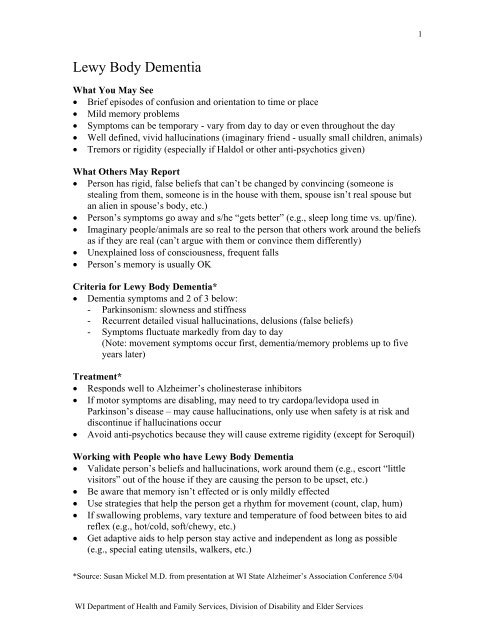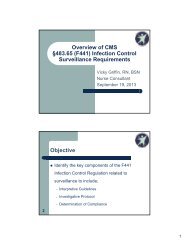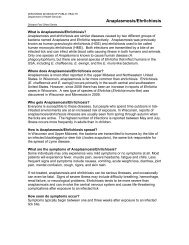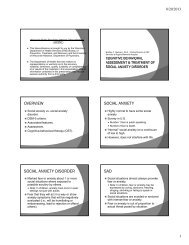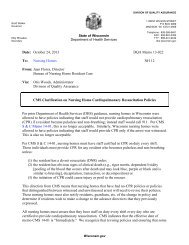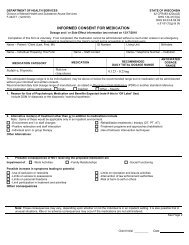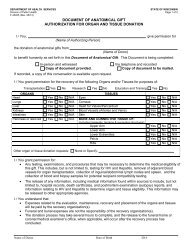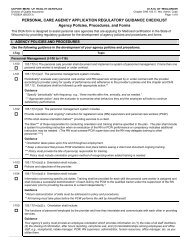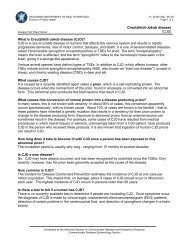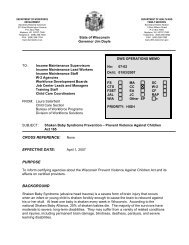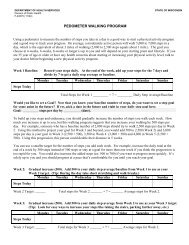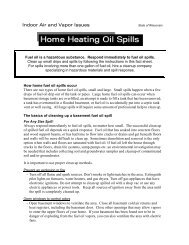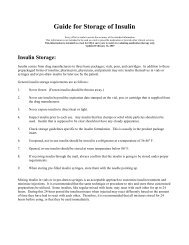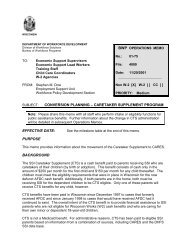Lewy Body Dementia - Wisconsin Department of Health Services
Lewy Body Dementia - Wisconsin Department of Health Services
Lewy Body Dementia - Wisconsin Department of Health Services
Create successful ePaper yourself
Turn your PDF publications into a flip-book with our unique Google optimized e-Paper software.
1<br />
<strong>Lewy</strong> <strong>Body</strong> <strong>Dementia</strong><br />
What You May See<br />
• Brief episodes <strong>of</strong> confusion and orientation to time or place<br />
• Mild memory problems<br />
• Symptoms can be temporary - vary from day to day or even throughout the day<br />
• Well defined, vivid hallucinations (imaginary friend - usually small children, animals)<br />
• Tremors or rigidity (especially if Haldol or other anti-psychotics given)<br />
What Others May Report<br />
• Person has rigid, false beliefs that can’t be changed by convincing (someone is<br />
stealing from them, someone is in the house with them, spouse isn’t real spouse but<br />
an alien in spouse’s body, etc.)<br />
• Person’s symptoms go away and s/he “gets better” (e.g., sleep long time vs. up/fine).<br />
• Imaginary people/animals are so real to the person that others work around the beliefs<br />
as if they are real (can’t argue with them or convince them differently)<br />
• Unexplained loss <strong>of</strong> consciousness, frequent falls<br />
• Person’s memory is usually OK<br />
Criteria for <strong>Lewy</strong> <strong>Body</strong> <strong>Dementia</strong>*<br />
• <strong>Dementia</strong> symptoms and 2 <strong>of</strong> 3 below:<br />
- Parkinsonism: slowness and stiffness<br />
- Recurrent detailed visual hallucinations, delusions (false beliefs)<br />
- Symptoms fluctuate markedly from day to day<br />
(Note: movement symptoms occur first, dementia/memory problems up to five<br />
years later)<br />
Treatment*<br />
• Responds well to Alzheimer’s cholinesterase inhibitors<br />
• If motor symptoms are disabling, may need to try cardopa/levidopa used in<br />
Parkinson’s disease – may cause hallucinations, only use when safety is at risk and<br />
discontinue if hallucinations occur<br />
• Avoid anti-psychotics because they will cause extreme rigidity (except for Seroquil)<br />
Working with People who have <strong>Lewy</strong> <strong>Body</strong> <strong>Dementia</strong><br />
• Validate person’s beliefs and hallucinations, work around them (e.g., escort “little<br />
visitors” out <strong>of</strong> the house if they are causing the person to be upset, etc.)<br />
• Be aware that memory isn’t effected or is only mildly effected<br />
• Use strategies that help the person get a rhythm for movement (count, clap, hum)<br />
• If swallowing problems, vary texture and temperature <strong>of</strong> food between bites to aid<br />
reflex (e.g., hot/cold, s<strong>of</strong>t/chewy, etc.)<br />
• Get adaptive aids to help person stay active and independent as long as possible<br />
(e.g., special eating utensils, walkers, etc.)<br />
*Source: Susan Mickel M.D. from presentation at WI State Alzheimer’s Association Conference 5/04<br />
WI <strong>Department</strong> <strong>of</strong> <strong>Health</strong> and Family <strong>Services</strong>, Division <strong>of</strong> Disability and Elder <strong>Services</strong>
2<br />
Frontal-Temporal Lobe <strong>Dementia</strong>s<br />
What you may see:<br />
• Inappropriate behavior:<br />
Compulsive drinking, swearing, hyper-sexual activities, shoplifting, etc. and<br />
repetitive actions; poor hygiene<br />
• No insight into own behavior being inappropriate<br />
• No apparent memory problems<br />
• Language and speech problems - using wrong words, not able to be fluent<br />
• Person may mimic your movements<br />
• Effects younger people with age <strong>of</strong> onset 30’s – 60’s<br />
What Others May Report:<br />
• Person has probably been misdiagnosed as having a mental illness - not responding to<br />
help or treatment for it<br />
• Person’s personality has changed – suddenly become a different person<br />
• Person is compulsively doing things and unable to recognize their own compulsion<br />
• Person’s memory is fine<br />
• Note: people with this dementia need to be followed by dementia diagnostic experts<br />
General Information on Frontal -Temporal Lobe <strong>Dementia</strong><br />
• Symptoms are gradual and progressive, onset not recognizable<br />
• Deterioration <strong>of</strong> frontal and temporal lobes at different rates cause different patterns<br />
<strong>of</strong> symptoms in two categories:<br />
- Gradual progressive changes in behavior (frontal)<br />
- Gradual language dysfunction (temporal)<br />
General Treatment <strong>of</strong> Frontal -Temporal Lobe <strong>Dementia</strong><br />
• Alzheimer’s cholinesterase inhibitors don’t usually help unless memory problems<br />
• Treatments are targeted to specific symptoms (e.g., behavioral, movement, etc.)<br />
• Complex treatment involving dementia symptoms and movement disorders – requires<br />
specialists, to balance treatments and not make other symptoms worse (e.g., antipsychotics<br />
will exacerbate movement symptoms)<br />
Four Subtypes <strong>of</strong> Frontal -Temporal Lobe <strong>Dementia</strong>*<br />
1. Frontotemporal <strong>Dementia</strong> (FTD)<br />
2. Primary Progressive Aphasia (PPA)<br />
3. Semantic <strong>Dementia</strong> (SD)<br />
4. Cortical Basal Ganglionic Degeneration (CBGD)<br />
*Source: Malgorzata Franczak M.D. presentation at WI State Alzheimer’s Association Conference 5/04<br />
WI <strong>Department</strong> <strong>of</strong> <strong>Health</strong> and Family <strong>Services</strong>, Division <strong>of</strong> Disability and Elder <strong>Services</strong>
3<br />
*Four Subtypes <strong>of</strong> Frontal -Temporal Lobe <strong>Dementia</strong><br />
1. Frontotemporal <strong>Dementia</strong> (FTD)<br />
• Used to be called “Picks Disease” – Picks Bodies cannot be determined until an<br />
autopsy is done and are rare, not the only cause <strong>of</strong> FTD<br />
• FTD is hereditary in 20%-40% <strong>of</strong> cases (Chromosome -17 linked)<br />
• Parkinson’s symptoms occur in 10% <strong>of</strong> C-17 cases<br />
• Early personality & behavior changes, memory is intact<br />
• Emotional blunting with no insight into own deficits early in the disease<br />
• Hyper-orality with overeating, overdrinking, hypersexuality (Kluver-Bucy Syndrome)<br />
• Problems with calculation<br />
• Mental rigidity<br />
• Obsessive compulsive behavior<br />
• Decline in personal hygiene, grooming<br />
• Stereotyped behavior<br />
• Primitive reflexes seen in babies (e.g., Babinsky Reflex on bottom <strong>of</strong> feet)<br />
• Early urinary incontinence<br />
2. Primary Progressive Aphasia (PPA)<br />
• Language dysfunction is first symptom<br />
• Early onset<br />
• Incorrect use <strong>of</strong> grammar<br />
• Looks like stroke symptoms but gets worse over time<br />
• Starts with word finding difficulties, moves to non-fluent speech, then muteness<br />
• Effects primarily the temporal lobe in left hemisphere<br />
• Memory and visual-spatial skills are intact early in illness – first 2 years<br />
• At end-stage it looks similar to end-stage Alzheimer’s disease<br />
3. Semantic <strong>Dementia</strong> (SD)<br />
• Very rare<br />
• Effects both temporal lobes<br />
• Compared to PPA the person is very fluent with speech<br />
• Difficulty in naming and comprehension<br />
• Unable to recognize common objects, functions<br />
• Preserved memory and spatial skills<br />
4. Cortical Basal Ganglionic Degeneration (CBGD)<br />
• Effects right part <strong>of</strong> brain causing apraxia (impairing muscles that perform speech),<br />
rigidity <strong>of</strong> the left side <strong>of</strong> the body, and frequent falls<br />
• “Alien Hand Syndrome”; Parkinson’s gait and tremor<br />
• Can’t move eyes up and down<br />
• People die more quickly than other dementia types<br />
*Source: Malgorzata Franczak M.D. presentation at WI State Alzheimer’s Association Conference 5/04<br />
WI <strong>Department</strong> <strong>of</strong> <strong>Health</strong> and Family <strong>Services</strong>, Division <strong>of</strong> Disability and Elder <strong>Services</strong>
4<br />
Alzheimer’s Disease<br />
What You May See:<br />
• Person may appear to be “normal”, memory problems may be hard to recognize<br />
• Person may seem confused - looking for a car, person, place, etc., that only exists in<br />
his/her past<br />
• Behavior may include:<br />
Repeating same questions or phrases, wandering, driving erratically, decreased<br />
inhibitions, anxiety, agitation when confronted, startle sensitivity, answering<br />
questions with information from the past<br />
What Others May Report:<br />
• Person’s changes were gradual over time, began with short-term memory problems<br />
• Person thinks the past is the present (is younger)<br />
• Rapid decline or behavior changes when ill (e.g., reversible causes like bladder<br />
infection)<br />
• Person is like a child in her/his abilities, but can remember things from long ago<br />
• Person can use his/her skills when prompted<br />
• Note: behavior symptoms start more in mid-stage<br />
Diagnosis <strong>of</strong> Alzheimer’s Disease<br />
• Specialized clinics/centers diagnose correctly 85-90% <strong>of</strong> the time<br />
• Progressive cognitive decline with early memory loss and impairment in at least one<br />
other area <strong>of</strong> cognitive function<br />
• Changes do not have other neurological signs or symptoms, psychiatric disease or<br />
systemic illness which the symptoms can be attributed to<br />
• “Mixed <strong>Dementia</strong>’ – other types along with Alzheimer’s disease, usually accounts for<br />
the other 10-15% <strong>of</strong> cases where Alzheimer’s is not diagnosed<br />
Treatment (RX)<br />
• Cholinesterase inhibitors – improve general alertness and slows clinical progression<br />
- Aricept (Donepezil)<br />
- Excelon (Galantamine)<br />
- Reminyl (Rivastigmine)<br />
• Nameda (Mematine) – blocks “excitotoxicity” (too much glutamate in nerve cells)<br />
in the brain’s hippocampus<br />
WI <strong>Department</strong> <strong>of</strong> <strong>Health</strong> and Family <strong>Services</strong>, Division <strong>of</strong> Disability and Elder <strong>Services</strong>


